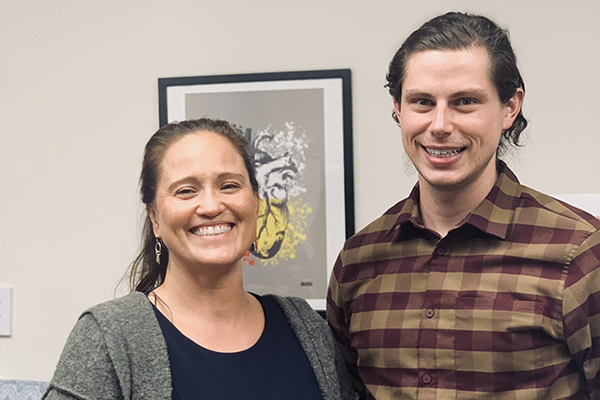Forging a new path for medical students
November 20, 2019
Share
This year, Thomas Dymond became the first-ever student in the Queen’s School of Medicine to do an extended clinical rotation in an Indigenous community, under the supervision of an Indigenous physician, caring for Indigenous patients. However, his path to doing so was not always clear – in fact, he charted an entirely new one that could change the way Queen’s medical students approach their upper-year clerkships.
Dymond, who is Mi’kmaq from the Bear River First Nation in Nova Scotia, hasn’t always found his medical school experience to be easy. Last year, he took time away from his studies because of stress, and began to feel uncertain about whether he would complete his degree.
During this time of uncertainty, he reached out to Ann Deer, an Indigenous Recruitment and Support Coordinator at Queen’s, who connected him with Dr. Ojistoh Horn, a Mohawk family physician in the Indigenous territory of Akwesasne – a community of 14,000 people that straddles the borders of Ontario, Quebec, and New York state.

Soon after reaching out to Dr. Horn, Dymond arranged to do a four-week elective – a precursor to clerkship – in Akwesasne. Dr. Horn, the sole full-time physician there, regularly works with visiting medical students to care for patients at a variety of clinics, on home visits, and at a long-term care facility. Thomas spent a month working alongside her, and for the first time, felt like he had found his place in medicine.
“The elective revitalized me mentally, physically, emotionally, and spiritually,” says Dymond. “I felt lifted up, like I was contributing, learning, and engaging. I wasn’t just giving back, I was also getting something out of it.”
A return to studies
At the end of his elective, Thomas knew he wanted to return – not only to his studies – but to this community he had come to adore. His biggest obstacle: there was not yet an approved path to completing his longitudinal integrated clerkship in Akwesasne. Newly invigorated, Dymond pushed onward.
With Dr. Horn’s support, Dymond drafted a letter to the Director of Clerkship and the Assistant Dean, Curriculum. In it, he made a passionate case, detailing how he would meet all of the curricular requirements for his pediatrics, family medicine and psychiatry clerkship courses by spending his four-month integrated rotation in Akwesasne, and laid out his plan.
“I wanted to go back to Akwesasne, but I also wanted to change clerkship, to change the system, to change medicine,” he says.
Returning to Akwesasne
He knew that it was an atypical request, and was fully prepared for the school to say no. Instead, his letter was acknowledged and passed along to Dr. Shayna Watson, Director of the Integrated and Family Medicine Clerkships, who was in immediate support of Dymond’s request. There were hurdles to be overcome in a short period of time – Dymond’s request was made only two months before his clerkship was to start – but she committed to making it happen.
Just before his clerkship was set to start, Dr. Watson confirmed that Dymond’s request to go to Akwesasne and work with Dr. Horn had been approved. Dymond is now completing his clerkship rotation at Akwesasne, and he could not be happier.
“I feel like I am fully supported for who I am,” says Dymond, “both an Indigenous person and a medical student.”
Thomas worked hard to forge a path for other Indigenous students in the School of Medicine, and his clerkship has broken new ground. While he navigates the challenges of establishing a new clerkship, he is setting a path for others, and helping to build an important relationship between the School of Medicine and the community of Akwesasne.
“As we work to Indigenize the school of medicine’s curriculum, forming relationships with nearby Indigenous communities is a crucial step,” says Dr. Leslie Flynn, Vice Dean Education, Faculty of Health Sciences, “Thomas is an exceptional student, and I am thrilled that he took the initiative to make this happen. He has led the way to enhancing our community partnerships.”